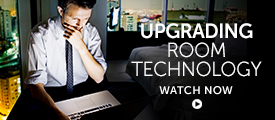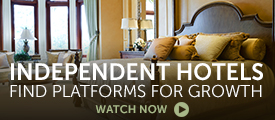According to a 2015 Lodging Technology Study, properties last year were allocating nearly 17% of their overall IT budget to guestroom technology. The study also found that 45% of properties had planned to upgrade their wireless in 2015.
Demands on bandwidth are ever increasing as more internet enabled devices are entering the hotel space, and are being used for streaming and other demanding tasks. Guests expect a smooth and speedy internet connection and will become frustrated by a substandard connection.
In this briefing experts discuss hotel technology and demand for wi-fi:
Hospitality Technology’s 2015 Lodging Technology Study highlighted another area where technology is being upgraded – entry to the hotel room. In 2015, 34% of properties were upgrading their room looks to use electromagnetic keycards (RFID keys) or smartphones as keys.
Individual room thermostat controls have also allowed hotels to improve their energy efficiency as it has meant that heating could be off in rooms that are unoccupied. This can also please guests as it allows them to adjust the temperature to one that suits them.
Next Gen thermostats are not the only smart objects appearing in rooms. According to Travel and Leisure, Starwood hotels can convert any appliance in the hotel room to a smart object, which would be controlled through an app.
Today’s traveller will bring his or her own mobile devices to a hotel, but that is not say their hotel experience cannot be improved with high quality in room technology. The Lodging technology study showed that at the beginning of 2015 15% of hotels were using Smart TVs and a further 16% were expected to add them. These Smart TVs allow the guest to connect to access TV or films that they may have a subscription to through an account such as Netflix or Amazon. 36% of properties planned to add or enhance HD content.
If you’ve been sent to this page and you’re not yet on the circulation list to receive these regular briefings and you would like to sign up, you can do see here. It’s free.
Video clips produced by ybc.tv for the Hospitality Channel, including interview from industry conferences such as the IHIF conference as well as specific Hospitality Channel shoots.



